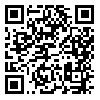Volume 10 -
IJMEHM 2017, 10 - : 55-66 |
Back to browse issues page
Download citation:
BibTeX | RIS | EndNote | Medlars | ProCite | Reference Manager | RefWorks
Send citation to:



BibTeX | RIS | EndNote | Medlars | ProCite | Reference Manager | RefWorks
Send citation to:
Ebrahimi S, Alinejad N. The Impact of Ethics Workshop on the Ethical Knowledge and Competency of fourth Years Medical Students of Shiraz University of Medical Sciences. IJMEHM 2017; 10 :55-66
URL: http://ijme.tums.ac.ir/article-1-5941-en.html
URL: http://ijme.tums.ac.ir/article-1-5941-en.html
1- Department of Medical ethics, School of Medicine, Shiraz University of Medical Sciences, Shiraz, Iran
2- Department of Medical Ethics, School of Medicine, Shiraz University of Medical Sciences, Shiraz, Iran
2- Department of Medical Ethics, School of Medicine, Shiraz University of Medical Sciences, Shiraz, Iran
Abstract: (5412 Views)
Today, due to the highlighted the importance of respect for the human dignity, and increasing awareness of patients, traditional methods of ethics training cannot meet the educational needs. In this cross-sectional study, the effect of medical ethics workshops on knowledge and attitudes of 40 fourth years medical students was studied. A pre-post questionnaire on the measurement of the importance of the medical ethics components, the self-assessment of ethical knowledge, behavior and professional ethics was presented. There was a significant difference between the mean score of the importance of the medical ethics components (questionnaire number 1) before and after the workshop (p = 0.002); but in the case of self-assessment of moral behavior (P = 0.64) and self-assessment of professional ethics compliance (p = 0.48), there was no significant difference between the mean score of students before and after the workshop. The analysis of log-books indicated that students understand, topics of confidentiality, informed consent, and breaking bad news; but issues such as empathy, respect for the patient's emotional state, interaction with a patient suffering from AIDS, informing the patient about the disease and the course of the treatment, accepting a mistake from the doctor, and apologizing to the patient were inadequately addressed by the students. Ethics training is not sufficient just at the beginning of the clinical course; it must also be trained actively in the hospital and on the patient's bedside.
Type of Study: Research |
Received: 2017/10/26 | Accepted: 2018/01/14 | Published: 2018/03/17
Received: 2017/10/26 | Accepted: 2018/01/14 | Published: 2018/03/17
Send email to the article author
| Rights and permissions | |
 |
This work is licensed under a Creative Commons Attribution-NonCommercial 4.0 International License. |





